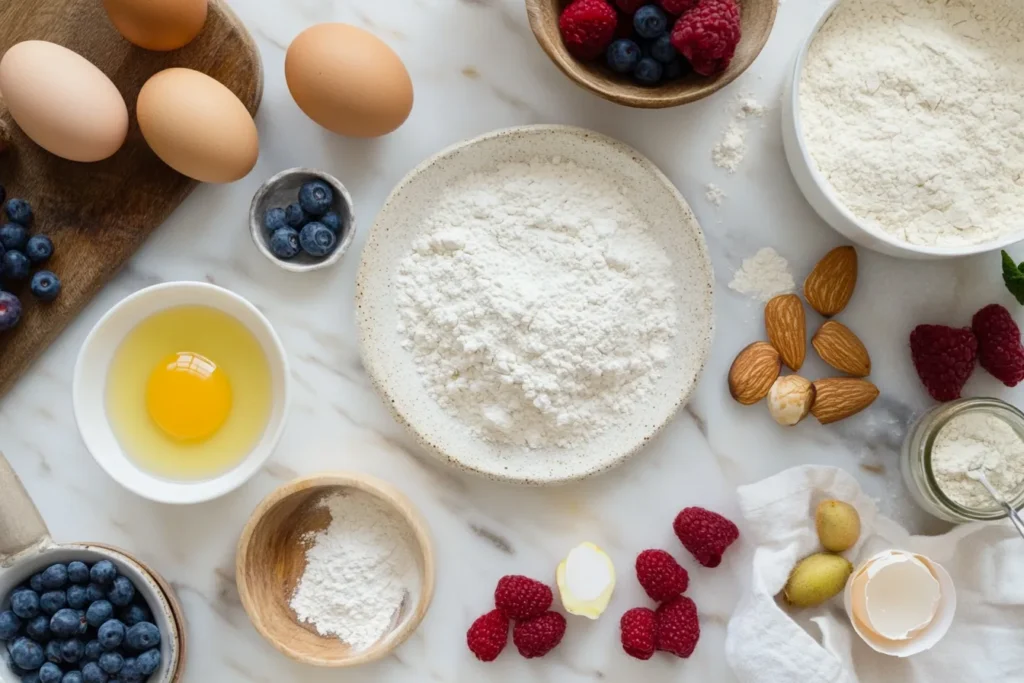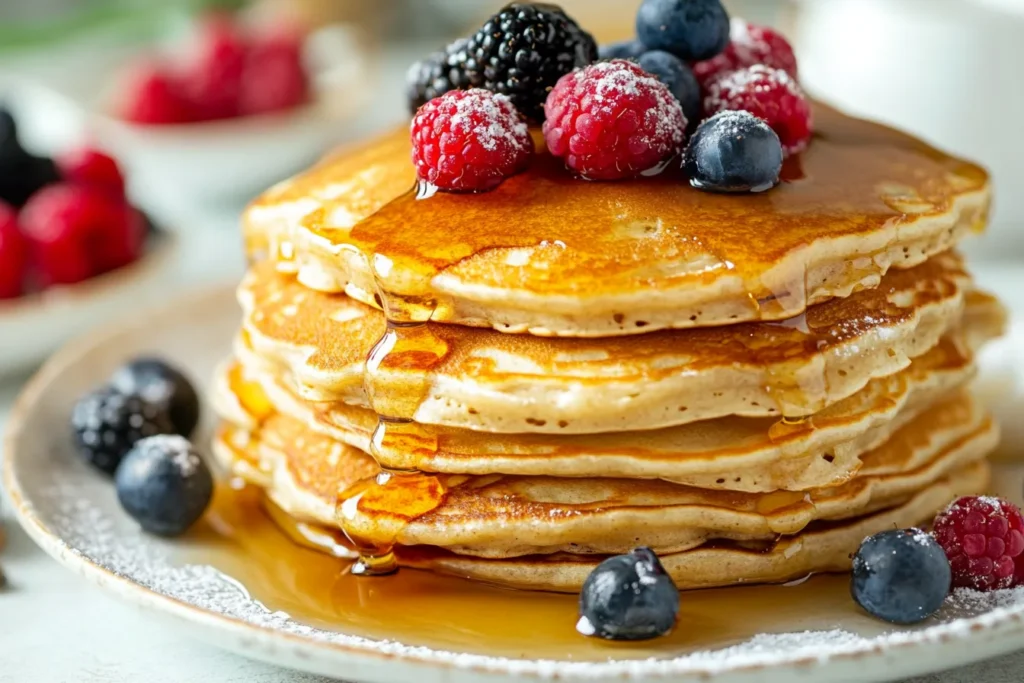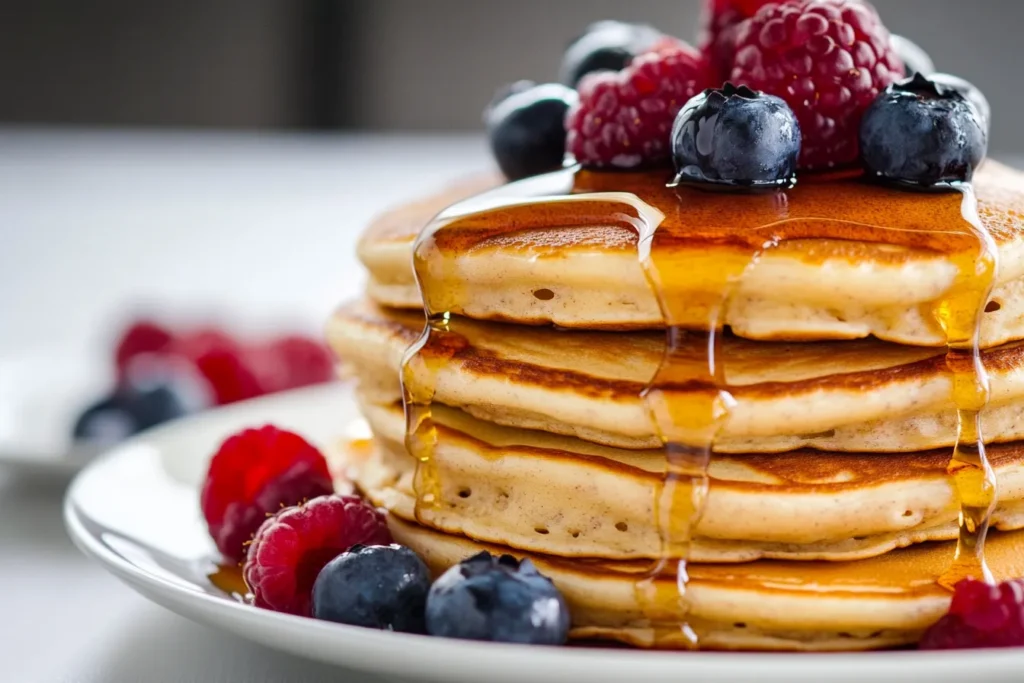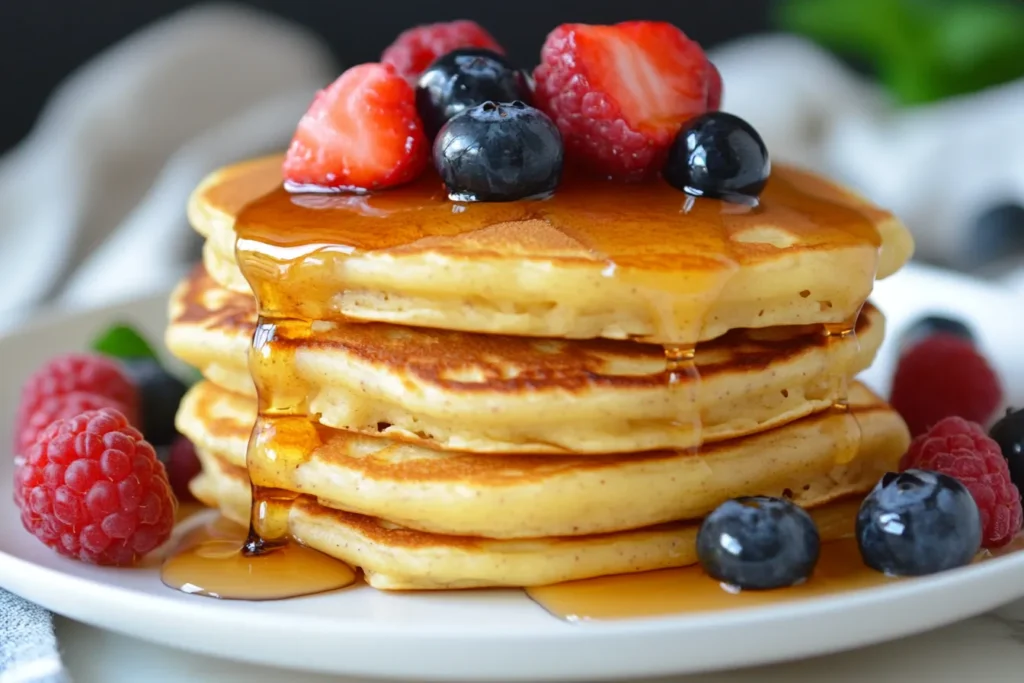Table of Contents
Are protein pancakes really healthy? This question often arises for those seeking a nutritious and convenient breakfast or snack option. Protein pancakes have gained popularity in recent years, especially among fitness enthusiasts and individuals looking to increase their protein intake. However, the nutritional value of these pancakes varies significantly based on ingredients and preparation methods. Let’s delve into the secret and incredible facts about protein pancakes and examine their overall health benefits (Are protein pancakes really healthy?).
Understanding Protein Pancakes
Protein pancakes are essentially pancakes that have been modified to include a higher amount of protein than traditional pancakes. They are typically made using protein powder, eggs, cottage cheese, or other protein-rich ingredients. This adjustment aims to create a more balanced and filling meal that can contribute to muscle building, satiety, and overall health. In addition, the use of alternative flours, such as almond or oat flour, often reduces the carbohydrate content compared to traditional pancakes made with all-purpose flour (Are protein pancakes really healthy?).
The Rise in Popularity
The increasing demand for convenient and healthy food options has fueled the popularity of protein pancakes. They offer a quick and easy way to incorporate protein into one’s diet, appealing to busy individuals who prioritize nutrition. Protein pancakes are versatile, allowing for various flavors and toppings, further enhancing their appeal. This adaptability makes them a favored choice for breakfast, post-workout meals, or even a guilt-free dessert.

Key Ingredients and Variations
The ingredients used in protein pancakes significantly impact their nutritional profile. Common ingredients include protein powder (whey, casein, soy, or plant-based), eggs (or egg whites), cottage cheese, Greek yogurt, almond flour, oat flour, and various fruits or spices for flavor. Variations can include different types of protein powders, the addition of seeds or nuts for extra nutrients, and the use of sugar substitutes to reduce calorie content. The specific combination of these ingredients determines the overall nutritional value of the protein pancakes.
Nutritional Benefits of Protein Pancakes
Protein pancakes can offer several nutritional benefits, primarily due to their higher protein content compared to regular pancakes. Protein is essential for muscle repair and growth, making these pancakes an excellent choice for athletes and fitness enthusiasts. Furthermore, protein promotes satiety, helping to control appetite and potentially aid in weight management.
Enhanced Protein Intake
The most apparent benefit of protein pancakes is their higher protein content. Increasing protein intake can contribute to muscle mass maintenance, improved metabolism, and enhanced recovery after exercise. A sufficient protein intake is crucial for overall health, supporting various bodily functions. Protein pancakes provide a convenient way to meet daily protein requirements, especially for those who struggle to consume enough protein through traditional meals.
Improved Satiety and Weight Management
Protein has a greater satiating effect than carbohydrates or fats, meaning it helps you feel fuller for longer. Protein pancakes can therefore assist in weight management by reducing overall calorie intake throughout the day. By including a high-protein breakfast like protein pancakes, individuals may find it easier to control their appetite and avoid unhealthy snacking. This can lead to better dietary habits and improved weight control (Are protein pancakes really healthy?).

Reduced Carbohydrate Content
Many protein pancake recipes utilize alternative flours like almond or oat flour, which have a lower carbohydrate content compared to traditional all-purpose flour. This reduction in carbohydrates can be beneficial for individuals following low-carb diets or those looking to manage their blood sugar levels. Moreover, these alternative flours often offer additional nutritional benefits, such as increased fiber and healthy fats. The use of these flours contributes to a more balanced macronutrient profile in protein pancakes (Are protein pancakes really healthy?).
Potential Drawbacks and Considerations
While protein pancakes offer numerous benefits, it’s essential to consider potential drawbacks. The quality of ingredients, the addition of unhealthy additives, and the overall macronutrient balance are crucial factors to evaluate. Not all protein pancake recipes are created equal, and some may contain hidden sugars, unhealthy fats, or excessive calories.
Quality of Ingredients
The nutritional value of protein pancakes heavily relies on the quality of the ingredients used. Protein powders, for instance, can vary widely in terms of purity, amino acid profile, and the presence of additives. It’s essential to choose protein powders from reputable brands and carefully review the ingredient list. Similarly, the use of fresh, whole ingredients like fruits and whole grains will enhance the nutritional benefits of the pancakes (Are protein pancakes really healthy?).
Hidden Sugars and Additives
Many commercially available protein pancake mixes contain added sugars, artificial sweeteners, and other additives to enhance flavor or shelf life. These additions can negate some of the health benefits of the pancakes. It’s crucial to read labels carefully and opt for recipes or mixes that minimize added sugars and artificial ingredients. Making protein pancakes from scratch allows for complete control over the ingredients, ensuring a healthier final product (Are protein pancakes really healthy?).
Macronutrient Balance
While protein is essential, a balanced macronutrient profile is crucial for overall health. Protein pancakes should contain a reasonable amount of carbohydrates and healthy fats to provide sustained energy and support various bodily functions. Overemphasizing protein at the expense of other macronutrients can lead to imbalances and potential health issues. A well-rounded protein pancake recipe should include a combination of protein, complex carbohydrates, and healthy fats.
Are Protein Pancakes Really Healthy? The Final Verdict
Are protein pancakes really healthy? The answer is nuanced and depends on several factors. When made with high-quality ingredients, minimal added sugars, and a balanced macronutrient profile, protein pancakes can be a nutritious and beneficial addition to the diet. They offer a convenient way to increase protein intake, promote satiety, and manage weight. However, it’s essential to be mindful of potential drawbacks and choose recipes or mixes carefully.

Homemade vs. Store-Bought
Homemade protein pancakes generally offer more control over ingredients and nutritional content. By making pancakes from scratch, individuals can ensure the use of high-quality protein powders, whole grains, and minimal added sugars. Store-bought mixes can be convenient but often contain hidden sugars, artificial sweeteners, and other additives. Reading labels carefully and comparing nutritional information is essential when choosing store-bought options (Are protein pancakes really healthy?).
Customizing for Individual Needs
Protein pancakes can be easily customized to meet individual dietary needs and preferences. Individuals with allergies or sensitivities can choose alternative flours, protein powders, or sweeteners. Those following specific diets, such as keto or vegan, can adapt the recipes accordingly. This versatility makes protein pancakes a suitable option for a wide range of dietary requirements (Are protein pancakes really healthy?).
Incorporating into a Balanced Diet
Protein pancakes should be viewed as part of a balanced and varied diet rather than a standalone health food. While they offer numerous benefits, they should be complemented with other nutrient-rich foods, such as fruits, vegetables, and whole grains. A well-rounded diet that includes a variety of nutrients is essential for overall health and well-being. Protein pancakes can be a valuable component of such a diet, providing a convenient and tasty way to increase protein intake.
The Amazing Ultimate Guide to Protein Pancakes
Mastering the art of protein pancakes involves understanding the ingredients, techniques, and variations that can elevate them from a simple breakfast to a nutritional powerhouse. Here’s an ultimate guide to help you create the perfect protein pancakes every time (Are protein pancakes really healthy?).
Choosing the Right Protein Powder
The choice of protein powder significantly impacts the flavor and texture of the pancakes. Whey protein is a popular option due to its digestibility and versatility. Casein protein provides a thicker consistency and slower release of amino acids. Plant-based protein powders, such as soy, pea, or brown rice protein, are suitable for vegans or individuals with dairy sensitivities. Experimenting with different protein powders can help you find the perfect match for your taste and preferences.
Mastering the Mixing Technique
Achieving the right consistency is crucial for fluffy and delicious protein pancakes. Avoid overmixing the batter, as this can lead to tough pancakes. Gently fold the wet ingredients into the dry ingredients until just combined. Lumps are acceptable and even desirable, as they prevent overdevelopment of gluten. Allow the batter to rest for a few minutes before cooking to allow the ingredients to fully hydrate (Are protein pancakes really healthy?).
Cooking to Perfection
Cooking protein pancakes at the right temperature is essential to prevent burning or undercooking. Use a lightly greased griddle or pan over medium heat. Pour the batter onto the hot surface and cook for 2-3 minutes per side, or until golden brown and cooked through. Flipping the pancakes too early can result in a messy and unevenly cooked product. Patience and attention to detail are key to achieving perfectly cooked protein pancakes (Are protein pancakes really healthy?).
FAQ
Keto Cottage Cheese Pancakes
Keto cottage cheese pancakes are a low-carb alternative to traditional pancakes, typically made with cottage cheese, eggs, and almond flour. They are popular among those following a ketogenic diet due to their high fat and protein content, with minimal carbohydrates. These pancakes offer a satisfying and delicious way to enjoy a pancake-like treat while staying within keto guidelines.
Is cottage cheese good for keto?
Yes, cottage cheese is generally considered good for keto. It is relatively low in carbohydrates and high in protein and fat, making it a suitable option for those following a ketogenic diet. However, it’s essential to check the nutrition label as some brands may contain added sugars. Full-fat cottage cheese is typically preferred for keto diets.
What are the 9 rules of keto?
The “9 rules of keto” aren’t universally defined, but generally encompass these principles: drastically reduce carb intake (usually under 50 grams daily), prioritize healthy fats, consume moderate protein, stay hydrated, monitor electrolyte balance, avoid processed foods, track your macros, stay consistent, and listen to your body. These guidelines help maintain ketosis and achieve desired results.
Why do bodybuilders eat pancakes?
Bodybuilders often eat pancakes as part of a balanced diet to fuel their workouts and support muscle recovery. While traditional pancakes may not be ideal due to their high carbohydrate content, protein pancakes made with protein powder and other nutritious ingredients can provide a convenient and tasty source of protein and complex carbohydrates. Bodybuilders may also use pancakes as a vehicle for adding toppings like fruit or nut butter, further enhancing their nutritional value.

